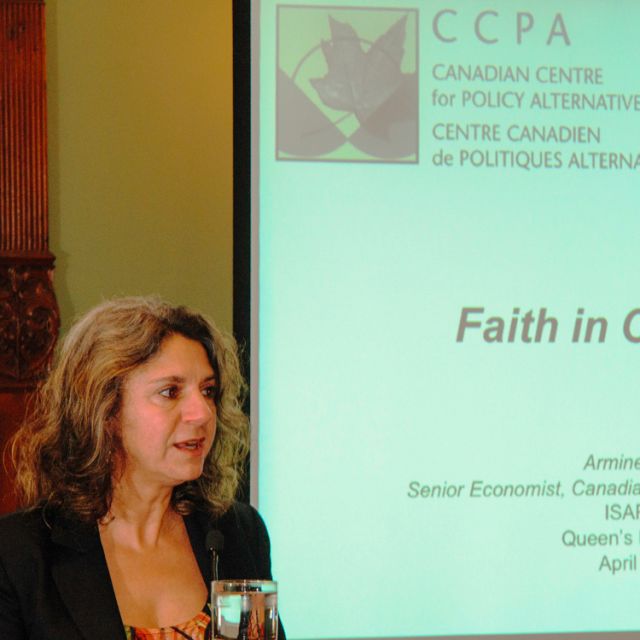“That giant sucking sound you’re hearing is the middle class going down the tubes,” economist Armine Yalnizian told about 100 ISARC members — Christians, Jews, Muslims and others who volunteer at food banks, agitate for affordable housing, counsel the jobless and organize communities.
The Assembly of Catholic Bishops of Ontario, Catholic Charities of the Archdiocese of Toronto and a number of Catholic religious orders are regular participants in ISARC events and campaigns.
The middle class is not an easy subject for religion to address, Anglican priest, theologian and author Maggie Helwig told the group. The scriptures of all the major religious traditions pre-date anything like a middle class. The closest the Bible comes to mentioning a class of people in between the rich and the poor is the occasional tax collector, she said.
For most of its history, Canada has been a society increasingly populated by the middle class — the merchants, technocrats and bureaucrats who provide services that link capital to labour. But being in the middle is becoming more difficult, both economically and spiritually.
“We are too easily manipulated by envy or by fear,” Helwig said.
When people are increasingly isolated — with weaker ties to jobs, unions, government or community — then politics and the advertising industry can either frighten them with the prospect of falling into poverty or tempt them with the illusion of wealth. “When we live out of those drives and emotions we are pulled away from our intended selves,” Helwig said.
Helwig described a modern idolatry of “desperate consumerism” in which the middle class are driven to accumulate more and more things to ward off its fears and escape into an illusion of wealth and security. St. Paul’s vision of the one body of Christ, to which we all belong and which constitutes our true identity, ought to stand in contrast to the isolating, alienating visions of class warfare, status envy and consumerism which dominate our culture.
When the middle class fears falling, it’s not an irrational fear, according to Yalnizian of the Canadian Centre for Policy Alternatives. Toronto’s youth unemployment rate is 18 per cent and overall unemployment rate 8.6 per cent, said the economist. Low paid work, defined as $10 per hour in 2002 dollars, has accounts for a rising percentage of the total work force. The number of jobs paying between $30,000 and $60,000 per year has been declining while the number paying less than $30,000 has increased. Between 2000 and 2005 the Toronto region has seen a 42-per-cent increase in the ranks of the working poor, according to a 2012 Metcalfe Foundation report on the working poor.
With 40 per cent of Canadian workers making less than they would have in the equivalent jobs in the 1970s and the richest 10 per cent now earning 75 times that of the poorest 10 per cent, we have created a winner-take-all economy, Yalnizian said.
“None of this is pre-determined,” she said.
Policy decisions to keep wages low and the work force flexible have included massive expansion of the Temporary Foreign Worker program, which floods the labour market with skilled workers who are cheaper than a journeyman trainee.
Much of the boomer generation will not suffer, but the next generation is increasingly at risk.
“For the first time in our economic history we cannot promise our children a better life,” Yalnizian said.
As tuitions have risen and summer job wages have stagnated or fallen, it’s no surprise that young people are graduating with massive debts and see education as a gamble. In 1979 it took 6.6 weeks of work to earn a year’s post-secondary tuition. By 2012 it took 17.6 weeks.
The job of religious leaders should be to put the economy in a context. Rather than “some kind of theology of a growing economy” we need a vision of the kind of society we want to live in, she said.
With the 11th largest economy in the world and one of the best educated populations on the planet, Canadians can afford to think about a society in which work and wages are only one element of many that bind people together, according to Yalnizian.
“We are not called to be workers. We are called to be something more than that,” she said. “The economy is not my concern. My concern is how people are living.”

